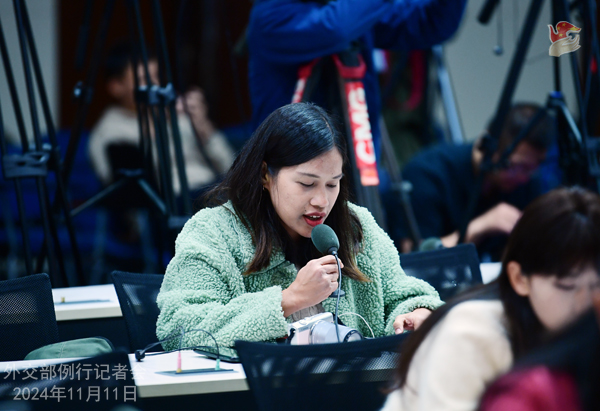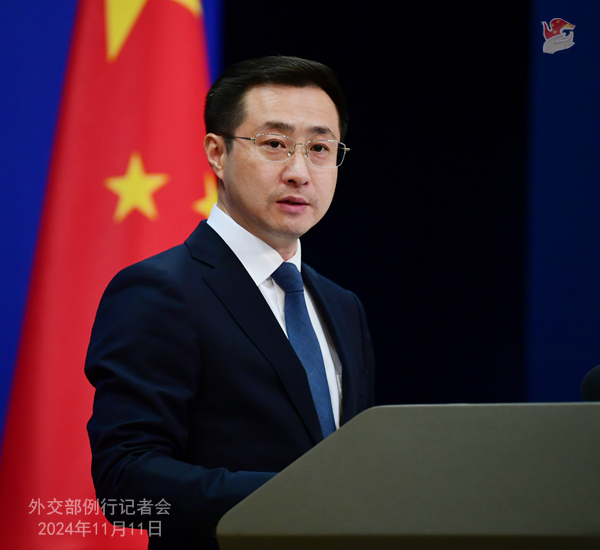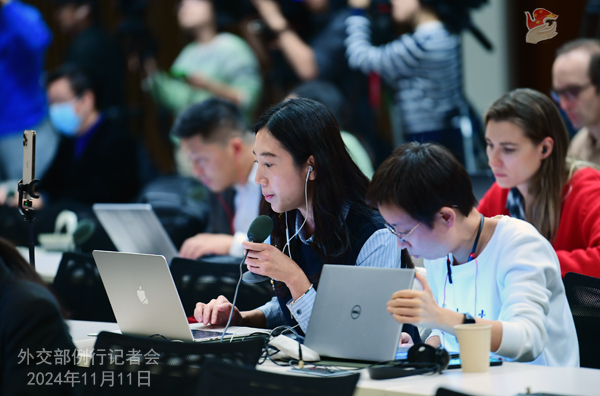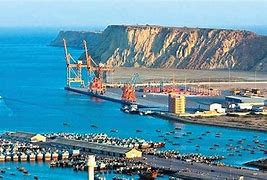Secretary of the Russian Federation Security Council Sergei Shoigu will attend the 19th round of the annual China-Russia strategic security consultation and the ninth meeting of the China-Russia law-enforcement and security cooperation mechanism in China from November 11 to 15. Member of the Political Bureau of the CPC Central Committee and Director of the Office of the Central Commission for Foreign Affairs Wang Yi and Member of the Political Bureau of the CPC Central Committee and Secretary of the Central Political and Legal Affairs Commission Chen Wenqing will hold talks with Security Council Secretary Sergei Shoigu respectively.
Kyodo News: It’s reported that in the second round of vote for a new Japanese prime minister at the House of Representatives, Shigeru Ishiba, President of the Liberal Democratic Party, was reelected as Prime Minister of Japan. Can I have your comment on that?
Lin Jian: It’s Japan’s internal affair. China doesn’t have a comment on that. The sustained, healthy and stable development of China-Japan relations serves the fundamental interests of the two peoples. We hope that Japan will work with China in the same direction, act on the principles and consensus in the four political documents between China and Japan, comprehensively advance the strategic relationship of mutual benefit, and build a constructive and stable China-Japan relationship fit for the new era.
China News Service: We noted that on November 8, President Xi Jinping and his wife viewed the cultural relics returned from overseas with Italian President Sergio Mattarella and his daughter Laura Mattarella. Could you share more details? What’s your comment on China-Italy cooperation on the repatriation of cultural relics?
Lin Jian: We welcome the return of the 56 pieces of Chinese artifacts that were lost overseas for years and highly appreciate Italy’s sense of responsibility in protecting cultural heritage and promoting the return of lost relics to countries of origin. President Xi Jinping and his wife viewed returned relics with Italian President Sergio Mattarella and his daughter Laura Mattarella a few days ago. This is the second event of this kind since the Chinese and Italian leaders witnessed repatriation cooperation outcomes in 2019. It demonstrates Italy’s respect for China’s cultural heritage and is a vivid example of China-Italy friendship.
In recent years, China and Italy have carried out sound cooperation on the recovery and return of lost relics and achieved fruitful results. In October 2022, competent authorities of the two countries started the repatriation cooperation on this collection of cultural relics under the framework of the bilateral agreement aimed at preventing the illegal import and export of relics. Based on the identification opinions and legal basis provided by China, Italy decided to return the relics to China. The competent authorities are discussing the protection, restoration, research and display of the returned relics. We stand ready to work with Italy to continue the dialogue and practical cooperation in relics repatriation and other fields, promote exchange and mutual learning between the two civilizations, and advance the deepening of the China-Italy comprehensive strategic partnership.
CCTV: You just announced that Secretary of the Russian Federation Security Council Sergei Shoigu will come to China to attend the 19th round of China-Russia strategic security consultation. Could you share with us the program and China’s expectations for this consultation?
Lin Jian: China and Russia are comprehensive strategic partners of coordination for a new era and maintain close communication on issues of mutual interest that have strategic and overarching significance. On November 12, Director of the Office of the Central Commission for Foreign Affairs Wang Yi will hold the annual strategic security consultation with Secretary of the Russian Federation Security Council Sergei Shoigu, who is on a visit to China upon invitation. The aim is to follow through on the important consensus reached by the two heads of state at their meetings this year, have in-depth communication and coordinate positions on bilateral relations and major issues concerning strategic security interests of the two countries, and enhance mutual trust. We will release timely information on the consultation and you may check back for updates.
Kyodo News: The Chinese government issued a statement yesterday which declares the baselines of the territorial sea adjacent to Huangyan Dao. Can you further brief us on that?
Lin Jian: On November 10, the Chinese government released a statement on the baselines of the territorial sea adjacent to Huangyan Dao. Foreign Ministry Spokesperson’s remarks on China’s release of the baselines and base points of the territorial sea adjacent to Huangyan Dao were also released on the Ministry’s website on the same day. You may refer to them for the specifics.
AFP: Regarding Russia’s Sergei Shoigu’s visit to China, can the Foreign Ministry provide details on his visit, including whether China will raise the question of North Korean troops deployed in Russia’s war in Ukraine, as well as what the US election of Donald Trump means for both countries and their relationship?
Lin Jian: On Secretary of the Russian Federation Security Council Sergei Shoigu traveling to China for the annual China-Russia strategic security consultation, we’ll release timely information. Please check back for updates.

Antara: In the Joint Statement Between China and Indonesia on Advancing the Comprehensive Strategic Partnership released by the Chinese government on Saturday, it is stated that the two sides will jointly create more bright spots in maritime cooperation including the areas of overlapping claims and agreed to establish an Inter-Governmental Joint Steering Committee to explore and advance relevant cooperation. In this regard, what are the areas of overlapping claims that need more discussion?
Lin Jian: China advocates pursuing joint development while setting aside disputes and is committed to working with neighboring countries across the sea through joint development to better put disputes under control, advance cooperation, uphold stability and achieve win-win results. China stands ready to work with Indonesia to deliver on the important common understandings reached between the leaders of the two countries and ensure that the outcomes of our cooperation can benefit the two countries and two peoples at an early date. Meanwhile, China is ready to actively explore and carry out maritime cooperation, including joint development, with other neighboring countries across the sea.
The cooperation document signed by China and Indonesia on maritime joint development mainly sets out the political consensus and cooperation direction of the two countries on joint development in areas of overlapping claims. The two sides will further explore specifics, such as the content and ways of cooperation.
Reuters: Over the weekend, a joint statement between China and Indonesia said both sides “reached important common understanding on joint development in areas of overlapping claims.” Indonesia’s foreign ministry said today that the country does not recognize China’s “nine-dash line” claims over the South China Sea despite striking a joint development deal with China. Does China view this “important common understanding” as an acknowledgement by Indonesia of China’s claims to parts of Indonesia’s Exclusive Economic Zone?
Lin Jian: China’s sovereignty and rights in the South China Sea are solidly grounded in history and the law. They were established in the long course of history and are consistent with international law and practices. As early as 1948, the Chinese government officially released the dotted line and reaffirmed its sovereignty and relevant rights in the South China Sea. China attaches great importance to signing the cooperation document on maritime joint development with Indonesia and stands ready to work with Indonesia to implement the important common understandings between the leaders of the two countries so that the cooperation results can benefit the two countries and two peoples as soon as possible.
Reuters: Following the recent attacks on Chinese nationals in Pakistan, has the concern for the security of Chinese citizens increased in Pakistan? If so, what are the concerns? Is Beijing satisfied with the security protocols for its nationals and projects in Pakistan?
Lin Jian: China reiterates that terrorism is a common enemy of humanity. It’s the shared responsibility of the international community to fight terrorism and prevent tragedies from happening again. China will continue to support Pakistan in fighting terrorism. We are firm in our commitment to protecting the safety and security of Chinese nationals, projects and institutions overseas. China and Pakistan have the resolve and capability to foil any attempt to harm China-Pakistan relations and ensure that terrorists will pay the price.
China and Pakistan are all-weather strategic cooperative partners. Our iron-clad friendship has taken deep roots among our peoples. Attempts to undermine the mutual trust and cooperation between the two countries will not succeed. China will continue to support Pakistan in developing its economy and society and improving people’s life. We will firmly carry out cooperation with Pakistan in various fields for the benefit of the two peoples.

Bloomberg: US media reports say that House Republicans are working on legislation that could remove China’s permanent normal trade relations status with the US or PNTR. We were wondering if the Foreign Ministry has any comments on this.
Lin Jian: Following the agreement between China and the US on China’s accession to the WTO, the US announced in 2001 to grant permanent normal trade relations status to China. Some US politicians are attempting to turn back the wheel of history and pull the China-US trade and economic relations back to the Cold War era. This violates WTO rules, and will only harm the common interests of both countries, and disrupt the global economy. We urge certain US Congress members to earnestly abide by WTO rules and stop saying or doing anything that do no one good.
China Review News: According to reports, the Department of State said in a statement on November 8 that the US supports the Philippines’ enactment of the Maritime Zones Act, which aligns Philippine domestic laws with the 1982 Law of the Sea Convention and the 2016 Arbitral Tribunal ruling. It also added that the US values Philippine leadership in upholding international law, particularly in the South China Sea, and calls on all states to comport their maritime claims to the international law of the sea as reflected in the Convention. Do you have any comment?
Lin Jian: Over the years, for the sake of its geopolitical agenda, the US has been instigating the Philippines to engage in acts of infringement and provocations in the South China Sea, as if the area needed any more instability. This vicious intention is so clear for all to see. While urging other countries to abide by the United Nations Convention on the Law of the Sea (UNCLOS), the US refuses to join it, which fully reveals its hypocrisy and double standards. The South China Sea arbitration in itself violates UNCLOS and is a political farce through and through, and the so-called arbitral award is illegal, null and void.
AFP: China’s Ministry of Commerce just announced that it found the European brandy industry to be dumping and will impose tariffs. Does the Foreign Ministry have anything further to add?
Lin Jian: I would like to refer you to competent authorities for this question.
AFP: According to a Wall Street Journal report, China is considering plans to give American allies in Europe and Asia tariff cuts, visa exemptions, investments and other incentives, citing sources. That’s reportedly a response to the reelection of Donald Trump, who has pledged tariffs of up to 60 percent on all Chinese imports. Does the Foreign Ministry have any comment on this?
Lin Jian: In a world fraught with challenges in development and increasing uncertainties and instability, China champions an equal and orderly multipolar world and a universally beneficial and inclusive economic globalization, and stands ready to work with all parties to uphold true multilateralism, build an open world economy, support sustainable development, and bring countries together to address challenges, achieve common prosperity and build a community with a shared future for mankind.
As for higher tariffs you mentioned, let me point out that there is no winner in a tariff war or a trade war. Nor will the world benefit from it.

Related Posts

















